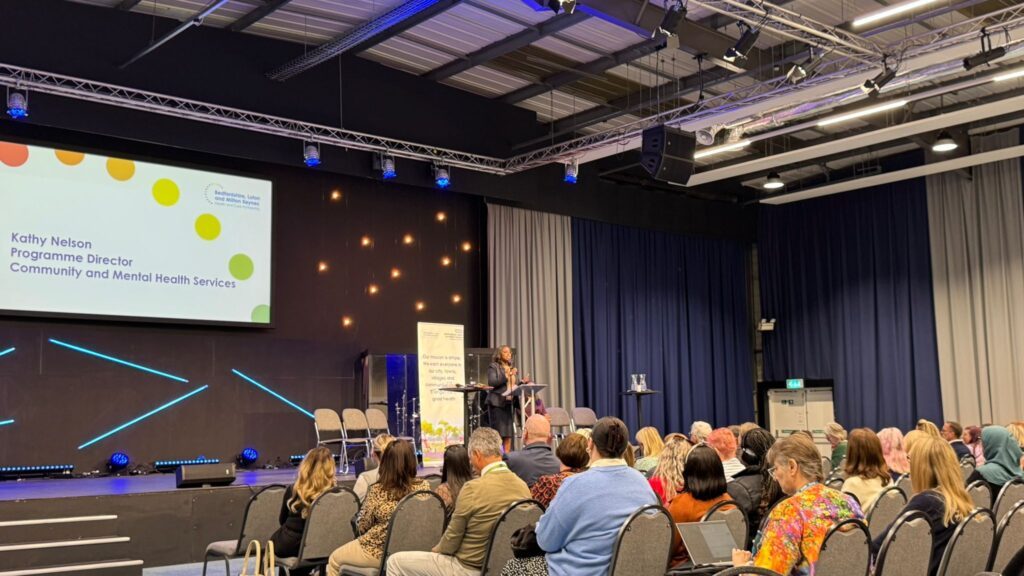18 December 2025
Youth Parliament members hope to ‘go viral’ to help the NHS this…
A group of young people from the Central Bedfordshire Youth Parliament could be heading for worldwide social media fame after creating a series of video…


Home » News » Local people gather to help redesign community and mental health services
Bold ambitions for the future of community and mental health services took centre stage at a major health event, as partners came together to better understand how we co-design services where stigma is challenged and access to support is seamless.
Over 200 people – including patients, carers, frontline health and care professionals, elected councillors and representatives of youth councils – took the opportunity to give Bedfordshire, Luton and Milton Keynes Integrated Care Board their views on current service provision and options for future development.

The event heard from experts – namely, patients and carers themselves – about their aspirations and priorities for future development of health services. The Government has set out three key shifts – from sickness to prevention, from analogue to digital, and from hospital to community – which aim to bring health services up to date, reflecting both changes in society and the technologies available.
Feedback from this event will help local health planners to improve and modernise community and mental health services, making sure they meet the needs of our growing and changing population. The long-term plan begins with listening to local experiences and identifying what needs to change.
A youth councillor from Milton Keynes, who had several friends receiving mental health care, said that by talking more about wellness rather than mental health and by encouraging communities and influencers to speak out on their own terms, it might be possible to break stigmas. Breaking vicious cycles connected to isolation, stress and unhealthy habits could also improve the health of the community, she said.
One participant, who was a carer for a family member with a mental health diagnosis, proposed 24-hour crisis services because many such needs arose in the middle of the night. Reflecting one of the Government’s key shifts, she believed that society should aspire to create an environment where people with mental health problems were able to live well most of the time: in an ideal world, she said, no patient would become so unwell that crisis services were necessary at all.
Professionals and patients both argued strongly in favour of assessments which were trusted across different services, reducing the need for duplication. Linked to this, greater IT integration would allow patient records to be readily available for those who had complex histories or who had lived in different parts of the country.
A community nurse with experience of making referrals argued for services where there was ‘no wrong front door,’ meaning that once a patient had contacted any mental health service, they would not be turned away because it was the ‘wrong service’. A fully up-to-date list of services commissioned and provided locally would also help professionals to make successful referrals, she suggested.
Another youth councillor from Luton wanted to see greater continuity in services for young people, particularly those at education transition points (between primary and secondary school, or between school and college), on the cusp of adulthood, or who also had a diagnosis involving neurodiversity.
Kathy Nelson, programme director for community and mental health transformation at Bedfordshire, Luton and Milton Keynes Integrated Care Board, said:
“It’s vital that we hear directly from people who have experience of using our services. Their insights are a vital element of the fact-finding we are undertaking, so that we can truly make a difference.
“Whilst it’s good to hear about occasions when patients and carers have got the support they need first time, arguably we learn far more from less positive experiences so that we can make changes and get it right in future.”
For press enquiries, please email blmkicb.communications@nhs.net
18 December 2025
Youth Parliament members hope to ‘go viral’ to help the NHS this…
A group of young people from the Central Bedfordshire Youth Parliament could be heading for worldwide social media fame after creating a series of video…
18 December 2025
Help us get loved ones home for Christmas
Local hospitals across Bedfordshire, Luton and Milton Keynes are calling on family and friends to help get their loved ones home before the holiday season. …
16 December 2025
Patients urged to use NHS services wisely ahead of planned doctors’ strike…
Patients in Bedfordshire, Luton and Milton Keynes have been asked to help the local NHS to preserve care for those who most need it, ahead of a national strike by…
1 December 2025
Digital records support care providers to work more efficiently and deliver more…
A project to support care providers in Bedfordshire, Luton and Milton Keynes to adopt digital records has achieved all its planned objectives and demonstrated an impressive return on investment. The…
14 November 2025
Local NHS preparing for strike action
The doctors’ union the British Medical Association has announced that resident doctors across the country will be taking industrial action for five days, after national pay negotiations failed to reach…
14 November 2025
New support for cancer patients across Bedfordshire and Milton Keynes launched
Bedfordshire, Luton and Milton Keynes Integrated Care Board (BLMK ICB) has launched a new suite of informative videos designed to support patients, families and carers throughout their cancer care journey.…